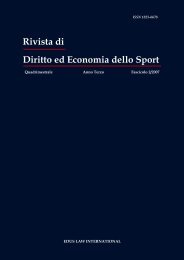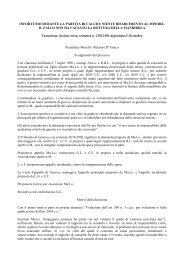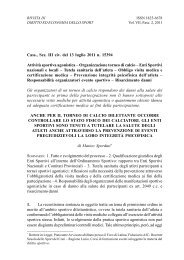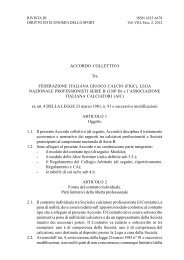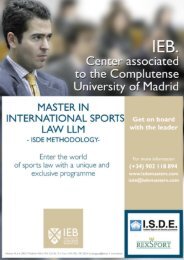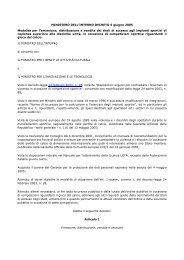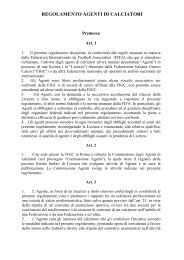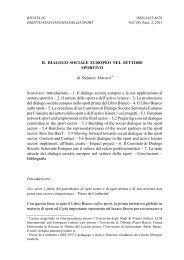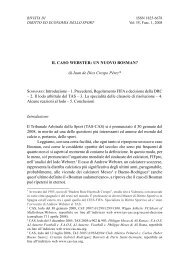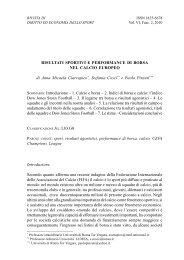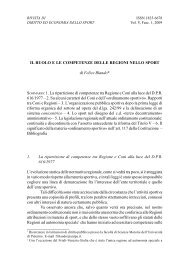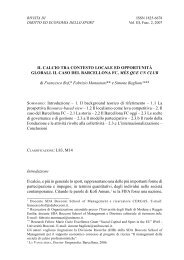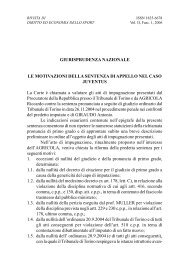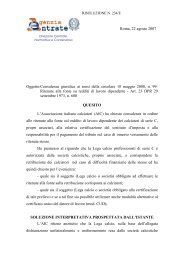European Sports Law and Policy Bulletin THE BERNARD ... - Slpc.eu
European Sports Law and Policy Bulletin THE BERNARD ... - Slpc.eu
European Sports Law and Policy Bulletin THE BERNARD ... - Slpc.eu
You also want an ePaper? Increase the reach of your titles
YUMPU automatically turns print PDFs into web optimized ePapers that Google loves.
54 Julien Zylberstein1.1.1.2 Classification of an athlete who has completed his training as aworker under EU lawAccording to the categories defined in the social legislation of the EU, an athleteat the end of his training period may, in principle, be considered analogous to astudent, 7 or as a worker. It would even appear that he is at the crossroads betweenthese two categories. The extent to which his freedom of movement is restricteddepends on which status applies.In this case, the Court stated quite plainly that Mr Bernard was a worker,simply asserting that «Mr Bernard’s gainful employment falls within the scopeof Article 45 TFEU». 8 This goes completely unchallenged: according to anestablished precedent, a non-amat<strong>eu</strong>r athlete is either a provider of services or aworker, i.e. «a person [who], for a certain period of time, performs servicesfor <strong>and</strong> under the direction of another person in return for which he receivesremuneration». 91.1.2 An incomplete legal argument?Having been gradually constructed on the basis of one-off decisions, the sportsrelatedcase law of the ECJ is naturally fragmented. Therefore, the judgment inthis case represented an opportunity for the Court, firstly, to refine its approachconcerning the scope of rules traditionally considered as lying outside the scope ofArticle 45 TFEU (1.1.2.1), <strong>and</strong> secondly, to reaffirm the inapplicability ofcompetition law to a rule (a sporting rule in this case) adopted by means of acollective agreement (1.1.2.2).1.1.2.1 Purely sporting rules generally considered to be outside the scope ofthe principle of free movement of workers disregardedAs a corollary of the principle that sport falls within the scope of Community law«only <strong>and</strong> precisely» 10 because it constitutes an economic activity, rules of apurely sporting nature, i.e. those that are justified by «reasons which are not ofan economic nature, which relate to the particular nature <strong>and</strong> context ofcertain matches <strong>and</strong> are thus of sporting interest only» 11 do not, in principle,____________________7Or, to quote Directive 2004/38, «a Union citizen enrolled at a private or public establishment,accredited or financed by the State, for the principal purpose of following a course of study». SeeArticle 7(1)(c) of Directive 2004/38/EC of the <strong>European</strong> Parliament <strong>and</strong> of the Council on the rightof citizens of the Union <strong>and</strong> their family members to move <strong>and</strong> reside freely within the territory ofthe Member States, OJ L 158, 30 April 2004, 77-123.8Para. 29 of the judgment.9ECJ, 3 July 1986, <strong>Law</strong>rie-Blum, C-86/96, ECR I-2691, para. 17.10Opinion of the Advocate General, para. 27.11ECJ, 14 July 1976, Donà, cit., para. 14; ECJ, 15 December 1995, Bosman, cit., para. 127; ECJ,11 April 2000, Deliège, cit., para. 43; ECJ, 13 April 2000, Lehtonen, para. 34.



